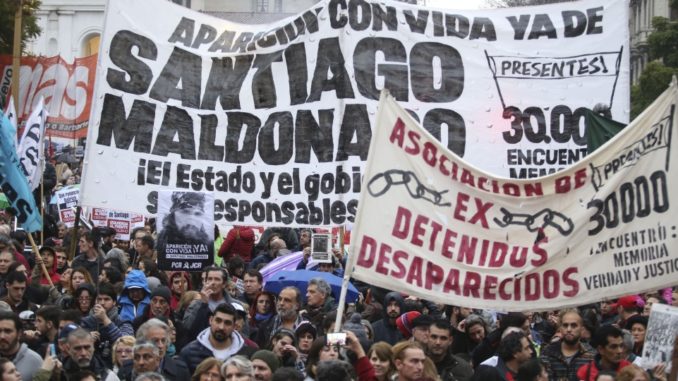
The social activist and craftsman Santiago Maldonado was disappeared by government security forces in August during a police raid on a Mapuche indigenous community in the Argentine province of Chubut. Since then, thousands across Argentina have taken to the streets and social media to ask the question: Where is Santiago Maldonado?
Santiago Maldonado, who is not Mapuche, lived and worked around 50 kilometers away from the Mapuche community of Lof Cushamen, a name which means “community” in mapudungún, the language of the Mapuche nation. Maldonado supported the Mapuche of this area in their claims for the recognition of their land, and travelled with community members to a demonstration where they demanded the release of their Lonko (leader) Facundo Jones Huala.
Santiago was a member of an activist group which was organizing against police repression of Mapuche communities. In January of this year, a member of his group had already been disappeared by the police for three days.
The disappearance of Santiago Maldonado took place on August 1st of this year during a highway blockade protest organized by Mapuche community members and supporters against the imprisonment of the leader Jones Huala. During the blockade, police forces shot at protesters with lethal ammunition and burned their tents down.
During the police assault, the Mapuche activists, along with Maldonado, tried to escape from the repression by running toward a river and crossing it. But Maldonado, who did not know how to swim, hid behind bushes instead of entering the water.
The last thing known to the public about Maldonado is that Mapuche witnesses heard a policeman say, “we have one of them!” Maldonado’s whereabouts have been unknown since that day, and the authorities are spreading false information with the aim of creating confusion among the public about the disappearance.
While government repression of the Mapuche in Argentina goes back centuries, the assaults on this indigenous nation escalated in 2015 when members of the Lof en Resistencia de Cushamen Mapuche movement decided to recover their ancestral lands after government officials denied their requests.
Argentina’s current right-wing President Mauricio Macri has decided to prioritize private property, even though the country’s constitution recognizes the ancestral rights of the native nations to own and work their territorial land.
According to the government, the owner of the land where the Lof Cushamen is situated is one of the most powerful businesses in the world: the Italian clothing company, United Colors of Benetton. The Benetton family started buying land in the south of Argentina in the 1990s. Since then, Benetton has acquired over two million acres of land in Patagonia. In order to understand the increasing level of conflict between the government and the indigenous communities in Argentina, it is crucial to look at the process of selling indigenous territories to multinational corporations.
The disappearance of Santiago Maldonado has struck a nerve in Argentina, where over 30,000 people were disappeared under the 1976-1983 US-backed dictatorship, the most recent in the nation’s history. The nightmare of that period still haunts Argentina as activists and relatives of the disappeared continue to demand justice. Maldonado’s disappearance is a sign that the political culture of the last dictatorship lives on under President Macri.
During the presidencies of Néstor and Cristina Kirchner (from 2003 to 2015), human rights were a central part of the policies made by the federal state. Since 2003, more than 1,000 military members were put in jail for crimes related to the disapearence of social activists during the last dictatorship. It was not complete justice because a lot of criminals – most of them civilians who were been involved in the genocide – were not accused and remain free.
On September 1st, more than 250,000 people marched to the Plaza de Mayo, the political center of the country located in front of the main government buildings, demanding the appearance of Santiago Maldonado.
Among the leaders of the march were the Madres de Plaza de Mayo, a social justice organization made up of mothers and family members of people who were disappeared during the country’s last dictatorship. They take their name from the marches members have historically organized in the plaza.
One Mother of the Plaza de Mayo addressed the massive crowd demanding Maldonado’s whereabouts: “Now we are feeling the same anguish as we did 40 years ago. It is this anguish that brought us to the Plaza de Mayo in the first place.”
Dario Farcy has a degree in Political Science and is a member of Democracia Socialista. He is involved in the self-management movement in Argentina, and he is part of the board of directors of Fedecaba (Federación de Cooperativas Autogestivas de Buenos Aires – The Federation of Self-Managed Cooperatives of Buenos Aires).
